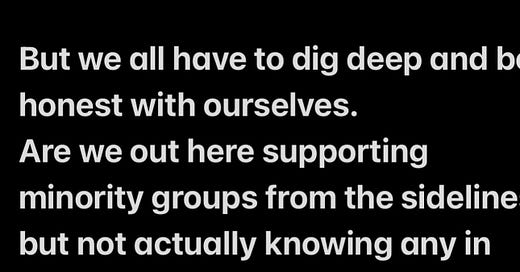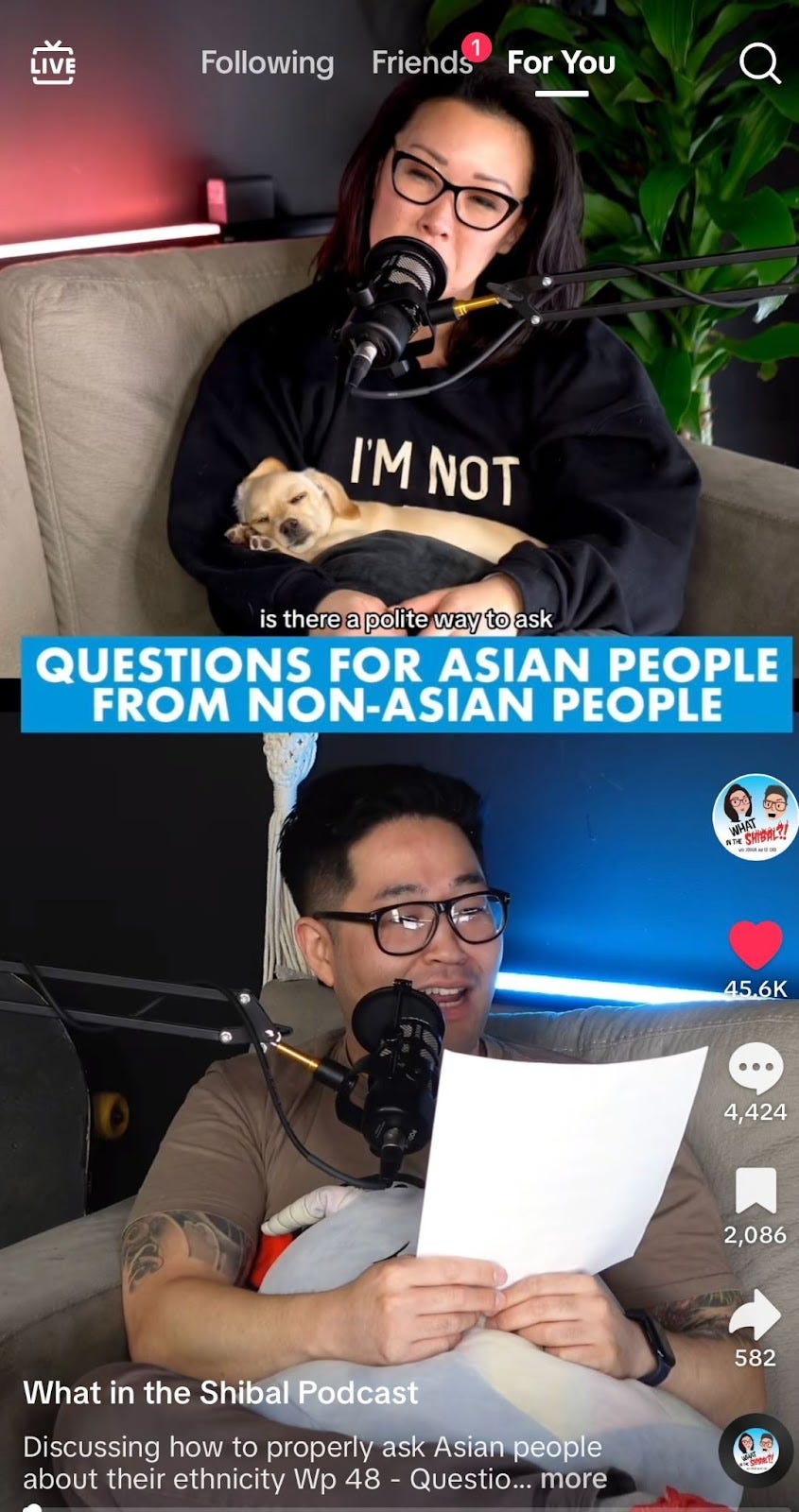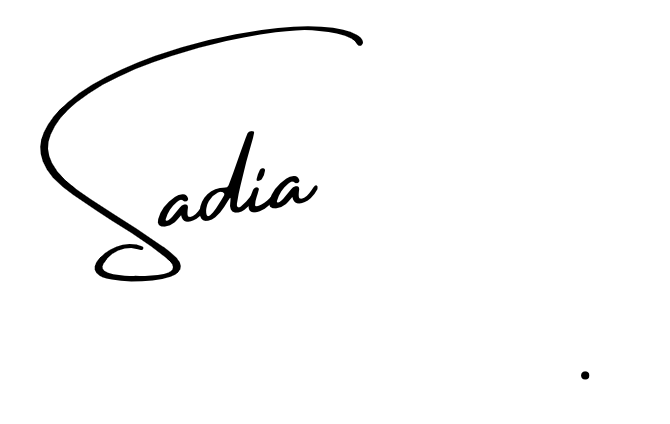#14 - Should you go out of your way to cultivate friendships with people of colour?
An exploration of awkward but age-old question.
Most educators would agree that the number one way to combat bias is to diversify where you get your information. Everything—from our choice of news channels to the influencers we follow to the books we read—impacts our understanding of the world and the different societal groups within it.
I wanted to examine the rather uncomfortable question of whether diversifying one's cultural consumption in this way should also extend to one's friendship circle. Put simply - should white people make a conscious decision to make friends with people of other ethnicities?
I was inspired to write about this after seeing this Instagram thread from Dr Ronx. They asked their white followers whether their advocacy for minoritised groups extended to their real lives, posing the question, "Are we out here supporting minority groups from the sidelines but not actually knowing any in real life".
Visual ID: This is a screenshot of an Instagram post with a black background and white text that reads: "But we all have to dig deep and be honest with ourselves. Are we out here supporting minority groups from the sidelines but not actually knowing any in real life" In the top left-hand corner, there is a small profile picture of Dr Ronx and a blue verification check mark.
It's a pertinent question when you consider that one-third of white Britons don't have any friends from a minority ethnic background, and in 2022, a study found that 90% of white Americans' friendship networks continue to be white—despite 42% of the US population being people of colour. These findings are understandable for areas without significant racial diversity, but what about those living in racially diverse towns and cities?
It’s an age-old question. In the mid-1980s, I remember watching an interview with actor Peter Horton, who played Gary Shepherd on the TV show Thirtysomething, where he was asked why all of the show’s seven lead actors were white. Horton retorted that 'It was normal for a group of white people to have friendships with other white people'. His sharp response stuck in my then-tween brain as, despite being born and raised in multicultural London, I could also see friendship groups segregated along racial lines all around me.
“Birds of a feather flock together”
This common British phrase* describes homophily—the tendency to form strong social connections with people with the same characteristics, such as age, gender, socio-economic class, race, or ethnicity.
I can't deny the truth at the heart of Peter Horton's curt response. If people form relationships based on commonalities, and their schools, universities, social spaces, and places of work are predominantly white, it’s bound to be reflected in their social circles, right?
Structural inequalities in the workplace
Since the murder of George Floyd in May 2020 and the subsequent racial reckoning, many organisations have acknowledged the long-overdue requirement to diversify their workforces. One of the most significant shifts, however, was the acknowledgement by business leaders that structural inequality has played a fundamental role in curtailing opportunities for people of colour - a shift from the previously held view that there was a lack of suitable candidates from these communities.
These leaders could no longer readily explain away why young Black men in London are up to three times more likely to be unemployed than their white counterparts - a disparity that persists even when these men hold university degrees. Or why a joint study by Stanford University, Harvard Business School, and the University of Toronto found that candidates who 'whitened their CV' were twice as likely to be invited for an interview than those who did not alter their CV.
I don’t want to ask this question, but let’s go there - could the same dynamics explored above come into play when we’re making new friends?
The importance of our cultural consumption
Our views of the world are influenced by the culture we consume. If we take publishing as an example, most characters in our books are white. As a result, white people are multifaceted, complex, fully rounded individuals - they are 'people'. Conversely, people of colour are often viewed solely through the prism of their race - navigating white-dominated society as 'other'. This positioning denies them the opportunity to be individuals - a theme explored brilliantly in the recent Oscar-winning film American Fiction.
If you're questioning the validity of this - take a moment to think if you've said or thought any of the following:
I wouldn't think a [Black] person would be into that [skiing]
She’s so articulate - she doesn't even sound [Asian]!
He’s not that [Asian] when you think about it!
They are just [Black] on the outside!
I don't think someone [Latino] would say something like that
I wouldn’t have known you were [Jewish]
You don’t look [Jewish/Muslim]
[East Asian] people are usually timid and not as loud as other races!
I didn't think I'd see a [Black] person here [Palm Beach]
When grouped like this, these statements sound pretty bonkers, but you’d be shocked by how regularly these themes crop up in everyday conversation.
"You're one of the good ones."
This one-dimensional thinking is something I've had to contend with recently as the crises in Palestine continues to evolve.
I carefully consider what I post on my personal Instagram and Language Matters accounts regarding Gaza. While I'm far from neutral in my stance, I strive to think critically about the views I hold and present. Instances of antisemitism and Islamophobia are rife at the moment, and we have to have our antennas on to ensure we're not falling foul of either. [AUTHOR’S NOTE: It’s perfectly possible to discuss geo-political issues and the decades-long plight of Palestinians as well as the Israeli hostages held captive in Gaza since October 7th without being either antisemitic or Islamophobic].
I've experienced well-meaning and much-respected friends commenting on my "balanced" approach and that "they wish there were more people like me". Although this presents itself as a compliment, it's a well-peddled Islamophobic trope predicated on the belief that Muslims cannot be reasoned as other cultures and faith groups are. Our mainstream culture presents Muslims as aggressive, angry and "mob-like", so any deviation from this stereotype is an exception.
The same categorisation applies to other underrepresented, historically excluded communities, which explains why cultural moments such as the releases of Marvel's 'Black Panther' and 'Crazy Rich Asians' are pivotal and have become so beloved by the communities represented.
So, how do we counter the one-dimensional view of communities when much of what we consume primes us to think otherwise? Here are some thoughts:
Diversify your cultural consumption: Yup—this again! Our views of communities we're not part of are subjective, shaped by how much information we may hold about them. When our exposure to other communities is limited, that information is at risk of being supplemented with pre-existing bias. Increased exposure to different communities decreases bias, as Stanford University's study, known colloquially as the Mo Salah Effect, has shown.
Trust your new data points: When you think an individual doesn't fit the archetype you have in mind, instead of doubling down on that thought, trust the latest data and perspective you’ve been provided with.
Listen when people from marginalised communities share their experiences with you. We often dismiss people’s lived experiences when they challenge us and make us feel uncomfortable. Please sit with that discomfort rather than changing the subject - it’s rude and minimising.
View individuals as a whole and not as one aspect of their identity: We're all well-rounded, fully-formed people and should be viewed as such.
If you mess up - apologise sincerely. Use your new information and insight and move forward accordingly.
Take responsibility for your education: People of colour, people with disabilities and members of the LGBTQIA community are not here to educate you on a problem they are impacted by but did not cause.
On reflection, having shared these thoughts, experiences and various studies with you - asking white people Why don’t you have Black/Brown friends?” feels like the wrong question.
People of colour aren't objects to be acquired as proof that one is not racist. I would hate to think I’ve been recruited as a friend simply for my skin colour!
The question white people should be asking is, "Am I the type of individual someone who's [Black/Brown/Asian/Latino/Indigenous] would want to be friends with? Someone they feel psychologically safe with? That’s the real question here because we won’t create a society free of racial prejudice by white people collecting racially diverse friends like Pokémon - we’ll get there by white people being better allies to the people of colour in their lives. Making that shift for people of colour and all other marginalised and underrepresented communities gets us a step closer to where we need to be as a society.
March recommendations:
📱 WATCH this TikTok from the 'What in the Shibal Podcast' where the hosts, Soogia & Ed Choi, discuss their reaction to the question: "What kind of Asian are you?" Their highly amusing response helps unpack why asking people, “Where are you from? No, where are you really from?” can be so troublesome.
Visual ID: This screenshot is taken from a TikTok video. It shows a split screen with an Asian man and woman sitting on a sofa, recording a podcast together. The text reads ‘Questions for Asian people from non-Asian people’. What in the Shibal Podcast? Discussing how to properly ask Asian people about their ethnicity.
📻 LISTEN to the 'A Muslim and a Jew Go There' podcast: This relatively new podcast, hosted by comedian David Baddiel (author of “Jews Don’t Count”) and politician Sayeeda Warsi (“Muslims Don’t Matter”), discusses matters involving and affecting British Muslims and Jews. While I don't agree with everything either of them says, I think it's an essential and much-needed discourse, especially in this current climate. I’ve learnt a lot from both of the past few weeks.
📖 READ The Glass Cliff’s The Glass Cliff: Why Women in Power Are Undermined—and How to Fight Back by Sophie Williams. I’m only a third of the way through this brilliantly researched and thought-provoking book, which explores how structural inequality disguises itself as the personal failures of women. William says, “Once we understand The Glass Cliff – we can stand together and face it head-first – we can start to unravel many other false narratives about women’s leadership experiences that don’t make sense without it. By understanding the phenomenon and telling one another about it, we can affect the conversation, empower one another to overcome societal bias and, ultimately, change the world of work for women forever”. Although I have yet to finish this book, I can confidently say it should be required reading for all CEOs and anyone who manages people.
That's everything for this month. Thanks as always for reading, and please leave any questions and comments below.







The Pokémon analogy lends itself well!
Also, very interesting about the Mo Salah Effect.
Great post, thank you.